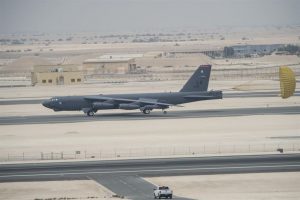
During a press conference on 12 April 2016 with journalists on his flight to the 32nd Space Symposium in Colorado Springs, United States, the US Deputy Secretary of Defense Robert Work said that Daesh are being hit hard by coalition operations, to include so-called “cyber bombs” and by the use of satellites.
Deputy Secretary Work told reporters, “I’ve got to tell you right now it now sucks to be ISIL.”
According to US defense news site Breaking Defense, Deputy Secretary Work went on to say that, “[T]hose guys are under enormous pressure. Every time we have gone after one of their defended positions in the last 10 months, we have defeated them. They have left. They have retreated. They are hunkering down.”
Deputy Secretary Work went on to say that, “[J]ust like we have an air campaign, I want to have a cyber campaign. I want to use all the space capabilities I have.”
In a speech given on 5 April 2016 to the Washington, DC-based think-tank, the Center for Strategic and International Studies (CSIS), US Secretary of Defense Ashton Carter told his audience that, “I’ve also brought Strategic Command and Cyber Command into these operations as well, to leverage their unique capabilities in space and cyber to contribute to the defeat of ISIL.”
Neither Secretary Carter or Deputy Secretary Work have provided further details as to how the space and cyber operations against Daesh are being conducted, but it is known that the US military relies on satellites like its Global Positioning System (GPS) to provide accurate targeting and guidance for the delivery of munitions; satellite communications for real-time coordination and command of operations; high-resolution satellite imagery for identification, tracking, and surveillance of enemy movements; and infra-red monitoring satellites for detecting the launch of even short-range missiles.
Similarly, Russian forces operating in Syria rely on their own satellites for similar functions, though they are not regarded as proficient in the integration of satellites in their force structures as the Americans.
US allies like Australia, France, and the United Kingdom are also reliant on the use of satellites similar to the US military, and regional allies like Saudi Arabia and the United Arab Emirates are becoming increasingly reliant on these same systems.
Details about how space is being used against Daesh are not forthcoming, and it is likely that they are being kept highly classified by the United States since their tactical and strategic advantages could be easily offset by the enemy should they understand how these space operations work.
 SpaceWatch.Global An independent perspective on space
SpaceWatch.Global An independent perspective on space

